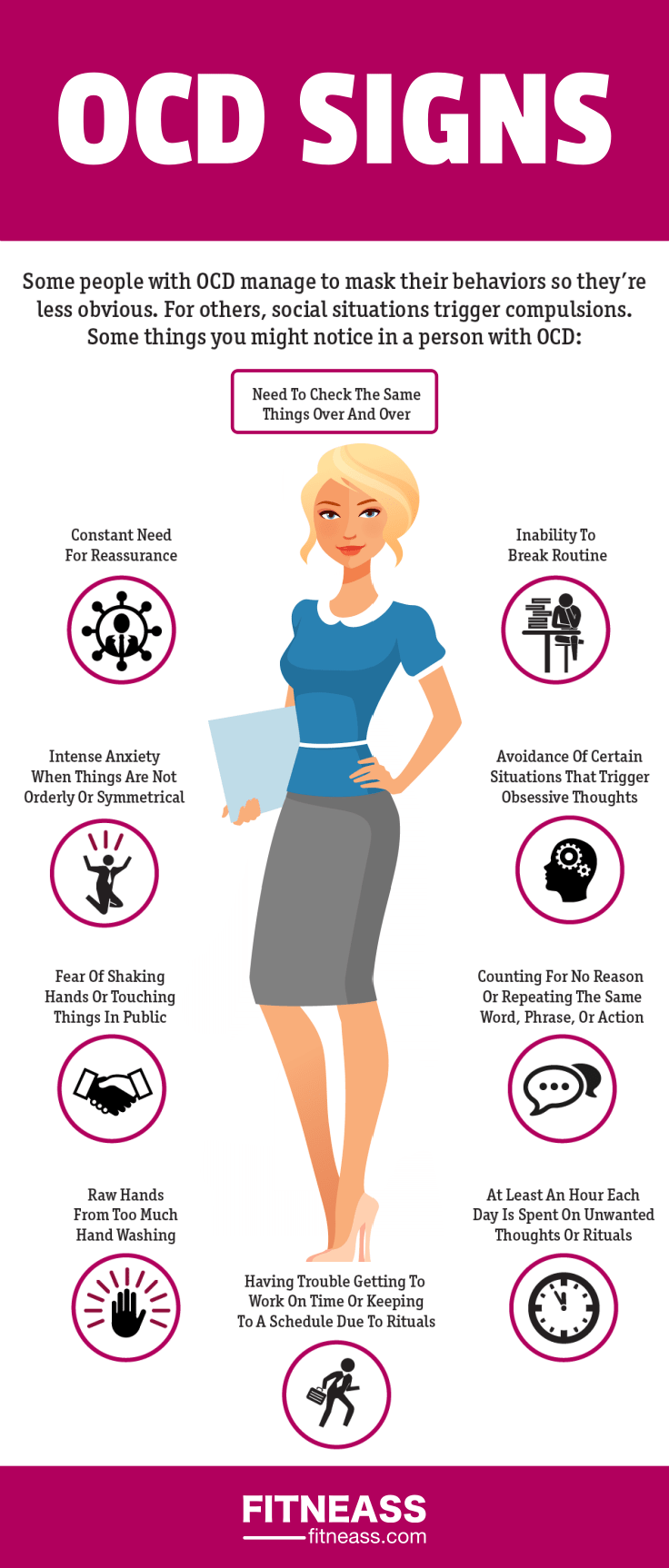OCD Signs (Obsessive-Compulsive Disorder Symptoms)

Obsessive-Compulsive Disorder (OCD) is a much-misunderstood mental health condition. Sometimes it’s very easy to spot a person suffering from it, but sometimes it just isn’t. So we’ve covered in depth both common and not-so-obvious OCD signs.
According to statistics, it affects approximately 2.3% of the US adult population. Plus, many more people who aren’t aware they have it or have yet to seek help.
The definition of OCD is mistaken by many, as the term is often used to describe someone who is very concerned with keeping things tidy and orderly or a person who is afraid of germs and compulsively washes their hands.
These actions can be manifestations of the disorder. But many people don’t realize that these behaviors are brought on by unwanted urges, thoughts, and images that the sufferer cannot control or ignore.
These intrusive thoughts completely disrupt a sufferer’s life. Many people develop coping mechanisms to appease intrusive thoughts, such as:
- washing hands to prevent contamination due to a fear of germs,
- opening and closing a door 10 times to prevent perceived harm from coming to the sufferer or a loved one.
So how do you know when you suffer from OCD?
The OCD Signs You Need To Be Aware Of
Here are some common OCD signs to look out for that might suggest a person close to you (or you) is suffering from OCD.
1. Repetitions
Repetitive behavior or “rituals” can occur in response to intrusive thoughts. This is defined by an action being repeated much more frequently than a person would usually do.
Common rituals to look out for include:
- Repeatedly “checking” things (that the stove is off, that a child is safely sleeping);
- Using switches repetitively (light switches or other appliances);
- Washing hands or items;
- Cleaning;
- Reading the same thing over and over;
- Counting;
- Hoarding;
- Arranging.
Behavior like this can be the result of the person feeling that they “remedy” their obsessive thoughts.
Therapy can help a person deal with their thoughts without having to enact the rituals they have developed to relieve the obsession.
2. Emotions
Is someone you know much more emotional than usual? Do they persistently ask questions, seek reassurance, experience doubt, appear distracted, or become angry much more than they used to?
These can all be responses to intrusive thoughts that the sufferer knows are unreasonable, but can’t explain or resolve. They can be highly distressing and disturbing, sometimes causing anxiety, depression and suicidal thoughts.
These emotional OCD signs should be spotted as soon as possible because they can lead to tragic consequences.
3. Avoidance
People with OCD can sometimes develop avoidance strategies in the hope that removing themselves from a triggering situation will not cause unwelcome thoughts.
If a person suddenly appears to be avoiding…
- Certain (or all) TV shows, the internet, or any media;
- Crowded/public areas;
- “Unclean”/untidy areas;
- Public bathrooms;
- Public eating spaces;
- Friends and family members.
…they may be exhibiting OCD signs.
Try to gently broach the subject of why they are avoiding these situations, to gain some more insight into whether it may be OCD.
4. Other OCD Signs
An array of other OCD signs may be exhibited by a person battling with obsessions and compulsions, including:
- Overthinking their relationships with other people;
- Having obsessive sexual thoughts that can’t be controlled;
- Thinking you may commit a violent act (people that suffer these thoughts are very rarely violent people, and are upset by these thoughts and wonder where they come from);
- Hating their looks;
- Fear of upsetting or offending people.

OCD Diagnosis
As you can see, the spectrum of OCD signs and symptoms is far broader than simply “being clean” or “washing your hands a lot”.
We hope this article has helped you to understand the causes behind compulsive behavior, and how to spot the warning signs that someone may need help.
After an OCD diagnosis, sufferers are often recommended cognitive behavioral therapy (CBT) that teaches coping mechanisms to deal with intrusive thoughts, psychotherapy, and sometimes may be offered medication.
These treatments allow sufferers to resume their normal healthy lives with great success. (Try to remind a person of this if they receive an OCD diagnosis.)
They may have to actively manage their condition for a long time or even for life, but this can be achieved over time with the right mental health help.
Hopefully, these OCD signs will help you notice whether you or one of your friends or family are suffering from this disease.